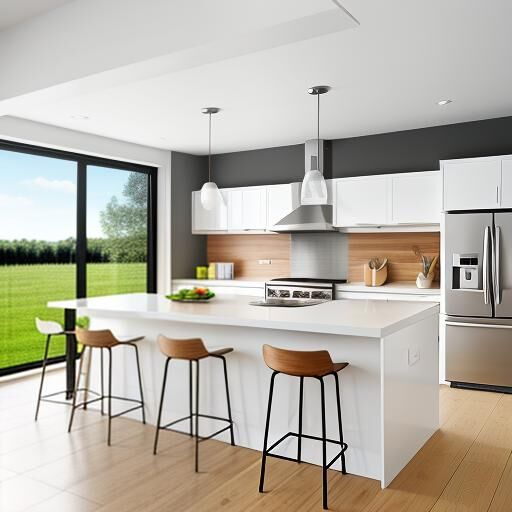Creating a peaceful and productive atmosphere at home with Feng Shui is all about optimizing the flow of “chi” (life force energy) and balancing the five elements (Wood, Fire, Earth, Metal, Water) to support your well-being. It’s about designing your space to feel good and serve your intentions.
Here’s a comprehensive guide:
Universal Principles for Peace & Productivity:
-
Declutter Relentlessly: This is the absolute foundation of good Feng Shui. Clutter creates stagnant energy, blocks opportunities, and leads to mental overwhelm and stress.
- Action: Go through every room. Keep only what you use, love, or truly need. Donate, discard, or store anything else. Don’t just hide clutter in closets; organize them too.
- Benefit: A clear space allows energy to flow freely, promoting mental clarity, focus, and a sense of calm.
-
Maximize Natural Light: Natural light is vibrant, positive “yang” energy. It boosts mood, improves focus, and brings vitality.
- Action: Open curtains and blinds during the day. Keep windows clean to allow maximum light in. Use mirrors strategically to reflect light into darker corners.
- Benefit: Enhanced mood, increased energy, and better concentration.
-
Ensure Clear Pathways and Flow: Energy needs to move smoothly.
- Action: Arrange furniture so there are clear, unobstructed paths between rooms and around major pieces. Avoid placing furniture that blocks doorways or windows. Pull furniture a few inches away from walls to allow chi to circulate.
- Benefit: Reduces feelings of being “stuck,” promotes ease of movement, and creates a sense of openness.
-
Embrace the “Commanding Position”: This is crucial for security and feeling in control.
- Action: For your bed, desk, and main sofa, position them so you can see the door to the room without being directly in line with it. Have a solid wall behind you for support.
- Benefit: Fosters a sense of security, control, and preparedness, reducing subconscious anxiety and enhancing focus.
-
Balance Yin and Yang: This refers to balancing opposing energies (e.g., active/passive, bright/dark, hard/soft).
- Action: Mix soft textiles (yin – cushions, rugs) with harder surfaces (yang – wood, metal). Incorporate a mix of warm (yang) and cool (yin) colors. Ensure adequate lighting for active times and softer lighting for relaxation.
- Benefit: Creates a harmonious and balanced atmosphere that feels comfortable and inviting for various activities.
-
Incorporate the Five Elements: Wood, Fire, Earth, Metal, and Water. Balancing these elements through colors, materials, and shapes creates harmony.
- Wood: Growth, vitality, creativity (plants, wooden furniture, green/blue colors).
- Fire: Passion, energy, inspiration (candles, warm lighting, red/orange colors – use sparingly for peace).
- Earth: Stability, grounding, nourishment (ceramics, stones, earthy tones like beige/yellow).
- Metal: Clarity, precision, efficiency (metal decor, white/gray/metallic colors, circular shapes).
- Water: Flow, abundance, tranquility (mirrors, fountains, wavy lines, black/dark blue colors).
- Action: Assess if any element is over or under-represented in a room and add accordingly. For example, if a room feels sterile (too much metal), add plants (wood) or warm lighting (fire).
- Benefit: Creates a balanced and vibrant space that supports different aspects of life.
Room-Specific Strategies for Peace & Productivity:
Living Room (Peaceful & Inviting):
- Seating Arrangement: Arrange sofas and chairs to encourage conversation (e.g., U-shape or L-shape). Ensure everyone seated has a view of the door (or a mirror reflection of it).
- Coffee Table: Choose a coffee table with rounded or soft edges to promote smooth energy flow.
- Lighting: Layer lighting – overhead for general illumination, lamps for ambient glow and task lighting for reading.
- Natural Elements: Incorporate plants (wood), a cozy throw (earth), and perhaps a small decorative fountain or artwork with water (water).
- Color Palette: Opt for calming colors like soft blues, greens, creams, and earthy tones. Use brighter accents (fire, yang) sparingly.
- Focal Point: Create a natural focal point, like a fireplace, a beautiful piece of art, or a well-arranged media center, that draws positive attention.
Home Office (Productive & Focused):
- Desk Placement (Commanding Position): Your desk should ideally face the door but not be directly in line with it. A solid wall behind your desk offers support and stability for your career. Avoid having your back to a window or an open door. If you must, use a mirror to see who enters.
- Chair: Use a comfortable, supportive chair with a high back to symbolize strong backing in your work.
- Minimal Clutter: Keep your desk surface clear of unnecessary items. Use drawers and organizers for storage.
- Natural Light & Plants: Position your desk near a window for natural light. Add a healthy plant to bring vital energy and purify the air.
- Colors: Blues and greens are excellent for concentration and calmness. Earth tones can provide grounding.
- Inspiration: Display inspiring artwork or objects that resonate with your goals.
- Define Your Space: If your office is in a multi-purpose room, use screens, rugs, or clever furniture placement to create a visual and energetic separation from other activities.
- Avoid Overhead Beams: Don’t sit directly under exposed ceiling beams, as they can create a feeling of pressure.
Bedroom (Peaceful & Restorative):
- Bed Placement (Commanding Position): Place your bed against a solid wall, ideally diagonally from the door. Avoid placing the bed directly under a window or in line with the door (“coffin position”).
- Headboard: Choose a solid, supportive headboard (wood or upholstered are good) to symbolize support in your life.
- No Mirrors Facing the Bed: Mirrors reflecting the bed are believed to disrupt sleep and invite a “third party” energy.
- Clear Under the Bed: Keep the space under your bed clear to allow energy to circulate freely around you while you sleep. Avoid storing anything under there, especially emotionally charged items.
- Symmetry: Place matching nightstands and lamps on either side of the bed to create balance and harmony in relationships.
- Calming Colors: Stick to soft, soothing colors like pastels, neutrals, blues, and greens. Avoid overly vibrant or fiery colors, which can be too stimulating for rest.
- Minimize Electronics: Keep electronics out of the bedroom, or at least away from the bed. The electromagnetic fields can interfere with sleep.
- Soft Lighting: Use dimmers and soft, warm lighting to create a relaxing ambiance.
- Avoid Work/Exercise Equipment: Ideally, keep work and exercise equipment out of the bedroom to maintain it as a sanctuary for rest and intimacy. If unavoidable, use a screen or curtain to separate them.
- No Water Features: Avoid fountains or aquariums in the bedroom, as the active water element can disrupt peaceful sleep.
By systematically applying these Feng Shui principles, you’ll not only create an aesthetically pleasing home but also cultivate an environment that genuinely supports your happiness, well-being, and ability to thrive. Remember, it’s a journey of mindfulness and adjustment, so trust your intuition and make changes that feel right for you.


